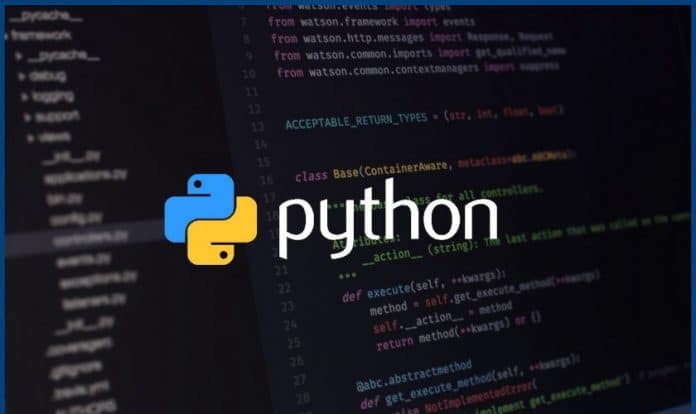When you ask Google, ‘best programming language’ what result do you expect?
Yes! You guessed it right!
It’s Python.
Python is a high-level programming language developed by Guido van Rossum in the Netherlands, first released in 1991. It is used primarily for web and application development. Python enables you to write programs with fewer lines of code than many other programming languages. The best part of Python is that its syntaxes are similar to the English language.
Let us have a look at how Python is described by the official homepage of Python.
“Python is powerful.. And fast; plays well with others; runs everywhere; is friendly and easy to learn; is Open”.
All the powerful features of Python are described in a single line.
Its readability makes it easy to learn for beginners. Python can easily be integrated with web services, GUI-based desktop applications, user-friendly data structures. Moreover, it is the best-known programming language for machine learning and data science applications.
The average annual salary of a Python developer is around USD 110,840. Some of the popular tech giants looking for Python developers are Accenture, IBM, Google, Adobe, Dell, and many more.
Since it is the world’s #1 programming language, many training providers offer free Python basics courses to let you grasp the basic concepts and upgrade your career as a Python developer or any domain that requires Python skills as the top priority.
Do you wish to learn Python, and that too for free?
Here’s a list of top resources that let you learn basic concepts of Python for free.
Contents
Top Resources to Learn Python for Free
1. Python for Beginners by Simplilearn
This is a beginner-level course offered by Simplilearn. This free Python course is specifically curated to cater to your understanding level. It covers the fundamental and advanced concepts of the language that will enable you to acquire the skills required to begin your career as a Python developer.
By taking up this course, you will learn about data types, lists, variables, loops, dictionaries, tuples, and decision-making statements. It also covers concepts like object-oriented programming, threading, user-defined functions, and Python scripting. By the end of this course, you will develop the skills such as:
- Core Python
- User authorization and authentication
- Multiprocess architecture
- Server Side templating language
- Web Frameworks
You can take up this course if you are a beginner, data scientist, data analyst, aspiring software developer, AI engineer, or simply a programming enthusiast.
This Python basic course by Simplilearn is by far the best online training course that you should pursue. There are ten hours of self-paced video lessons. Besides, you can access this free course for 90 days.
2. Introduction to Python by DataCamp
This free introduction to Python course by DataCamp provides you with one of the most popular platforms for programming. The best part of this course is that it is interactive, and you can check your progress level through each lesson. You will learn all the fundamental concepts of Python along with some of the advanced topics such as functions, lists, and packages.
This course has excellent user reviews as you get to learn with the most popular interactive platform. The course is especially helpful for candidates who want to learn the processes involved in analyzing the data.
3. Python Programming: A Concise Introduction by Coursera
This is a free online course offered by Wesleyan University by Coursera. By taking this course, you will get a hands-on introduction to Python 3x. This is a four-week program that contains four interactive modules featuring short lessons followed by practical exercises to practice every new concept you learn.
After the completion of this course, you will learn how to use the Spyder development environment, to work with lists and import libraries, learn to read and write text and CSV files, and also to learn tuple and data dictionaries. Besides, you get acquainted with functional values, formatting, sorting, statistics, and a menu-driven database program.
4. Computing in Python III: Data Structures by edX
If you have some experience working with loops, conditionals, and functions, this comprehensive course is designed. So this course will let you advance with more complex data structures and learn topics like lists, strings, dictionaries, and file input and output.
This course is organized into five chapters which you can complete in five weeks, although you can learn at your own pace. Like all other edX courses, you can complete the quizzes, lessons, and exercises for free.
5. Google Python Class by Google
This course is offered by Google for education. This free Python class is curated by one of their expert programmers Nick Parlante. Though the course does not involve the curriculum for Python3, the course is still helpful in learning basic concepts of Python. Also, many of the concepts are usually interchangeable.
This course is one of the top choices for beginners because of its simple and straightforward approach. There is an outline of each module on the left side of the screen, followed by a list of video lectures. The list ends with hands-on exercises to make you go through a practical approach. The lessons are written in text tutorials, making it convenient for those who want to learn by reading.
The course starts with teaching the basic concepts of setting up the software and moving towards lists, strings, sorting, dictionaries and files, utilities, and regular expressions.
Conclusion
With the increasing popularity of Python, the number of training providers offering free online courses and massive open online courses (MOOCs) is also increasing. You are required to choose wisely from many courses available so that you can grasp all the basic concepts of Python properly.
Most of the courses improve your skillset, enhance your marketability, or enable you to upgrade your career. You can learn Python for no reason, as learning never goes in vain. After all, it is the world’s #1 programming language. The best part of the majority of online courses is that there is no start and stop time. You can learn entirely at your own pace.
Get yourself enrolled now!












![Index of Money Heist [Season 1, 2, 3 & 4 – All Episodes, Cast and Plot] Index of Money Heist](https://www.asiamediajournal.com/wp-content/uploads/2021/05/Index-of-Money-Heist-3-100x70.jpg)